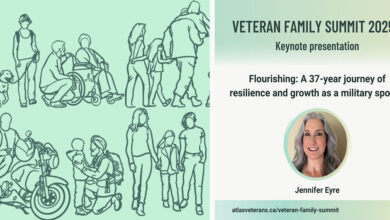Programs & Services
Can Praxis still helping families combat PTSD
In the three short years since it was first founded, Can Praxis, the three-phase equine assisted program to aid those with mental injuries, has grown leaps and bounds receiving international recognition and increased support at home.
Can Praxis, established in Feb. 2013, helps military members and their loved ones manage conflict through a nine-day program divided into three phases and through the use of horses. Through the help of Wounded Warriors Canada, the program is expense free for participants.
Their growing success caught the attention of Veterans Affairs Canada, who pledged $25,000 this past summer to Can Praxis to continue their research.
Since its inception, Can Praxis has been monitored by Dr. Randy Duncan, in conjunction with the University of Saskatchewan. Dr. Duncan compiles empirical data and sends feedback to program founders, Steve Critchley, and Jim Marland.
The money received from Veterans Affairs will be used to study the effect of phase two and phase three of the program. Phase two follows up with the patients after their initial learning sessions in phase one. It brings back either ten veterans or ten family members separately for three days. During that time, they learn to care for and ride the horses while spending time with peers and learning from one another.
Critchley says this is a crucial step as they’ve seen an alarming trend in the growing rate of suicidal spouses. They are ensuring that all facilitators are properly educated. This is also a vital reason why spouses are included in the program.
The research also looks at phase three of the program that brings couples back together for a three-day pack-ride in the mountains.
All three phases play a crucial role in helping couples to start having successful communication.
“It’s like a couple has been given a box and in that box is 5,000 pieces of a jigsaw puzzle. The challenge is that there is no picture on the cover. So what our job at Can Praxis is is to help people find the four corners and by working together build the boundary of their puzzle. A combination of other therapies, programs, and medications will eventually help them to build the whole picture,” said Critchley.
The data generated by Dr. Duncan proves that the short-term success of the program is over 90 per cent while the long-term success, two years or more, is around 65 per cent.
This success has attracted a lot of international attention. Critchley says they have been contacted by the U.S., U.K., Israel, and Uganda. The U.S. Department of Veteran Affairs is closely following the results of Can Praxis. Can Praxis has reached out to veterans groups in Australia to start similar programs and are looking into fundraisers to help veterans in Uganda.
“The success rate we are having is quite humbling. I’d love to say Jim, and I are geniuses. It’s not. We were just very fortunate that a collision course brought our particular skillsets and experiences together,” said Critchley.
Critchley believes another key to Can Praxis’ success is the peer support attendees gain. Many of the attendees have even formed an alumni group.
Though the program started in Rocky Mountain House, Alberta, the organization has been able to establish programs in Ontario. This year, Can Praxis ran four programs at WindReach Farms, located in Southern Ontario. They plan to run four programs again next summer.
The Can Praxis founders are also looking into expanding the program into Quebec by 2016.
“We can’t leave our French brethren out there on their own, so we are actively working on programs to start running in Quebec,” noted Critchley.
Looking ahead to the future, Critchly hopes that Can Praxis can become an accepted standard program across the board to help individuals and families combating PTSD.











